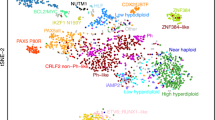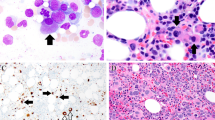Abstract
With the advent of large collections of adaptive immune receptor recombination reads representing cancer, there is the opportunity to further investigate the adaptive immune response to viruses in the cancer setting. This is a particularly important goal due to longstanding but still not well-resolved questions about viral etiologies in cancer and viral infections as comorbidities. In this report, we assessed the T cell receptor complementarity determining region-3 (CDR3) amino acid (AA) sequences, for blood-sourced TCRs from neuroblastoma (NBL) cases, for exact AA sequence matches to previously identified anti-viral TCR CDR3 AA sequences. Results indicated the presence of anti-viral TCR CDR3 AA sequences in the NBL blood samples highly significantly correlated with worse overall survival. Furthermore, the TCR CDR3 AA sequences demonstrating chemical complementarity to many cytomegalovirus antigens represented cases with a worse outcome, including cases where such CDR3s were obtained from tumor samples. Overall, these results indicate a significant need for, and provide a novel strategy for assessing viral infection complications in NBL patients.



Similar content being viewed by others
Availability of data and material
The data supporting the results in this article are available in the supporting online material.
Abbreviations
- AA:
-
Amino acid
- CDR3:
-
Complementarity determining region-3
- CMV:
-
Cytomegalovirus
- CS:
-
Complementarity score
- dbGaP:
-
Database of genotypes and phenotypes
- EBV:
-
Epstein Barr virus
- HCV:
-
Hepatitis C virus
- HIV:
-
Human immunodeficiency virus
- KM:
-
Kaplan–Meier
- NBL:
-
Neuroblastoma
- OS:
-
Overall survival
- TARGET:
-
Therapeutically applicable research to generate effective treatments
- TCR:
-
T cell receptor
- WXS:
-
Whole exome sequence
References
Bagaev DV, Vroomans RMA, Samir J, Stervbo U, Rius C, Dolton G, Greenshields-Watson A, Attaf M, Egorov ES, Zvyagin IV, Babel N, Cole DK, Godkin AJ, Sewell AK, Kesmir C, Chudakov DM, Luciani F, Shugay M (2020) VDJdb in 2019: database extension, new analysis infrastructure and a T cell receptor motif compendium. Nucleic Acids Res 48(D1):D1057–D1062. https://doi.org/10.1093/nar/gkz874
Chobrutskiy BI, Zaman S, Tong WL, Diviney A, Blanck G (2018) Recovery of T cell receptor V(D)J recombination reads from lower grade glioma exome files correlates with reduced survival and advanced cancer grade. J Neurooncol 140(3):697–704. https://doi.org/10.1007/s11060-018-03001-1
Chobrutskiy BI, Chobrutskiy A, Zaman S, Yeagley M, Huda TI, Blanck G (2021) High-throughput, sliding-window algorithm for assessing chemical complementarity between immune receptor CDR3 domains and cancer mutant peptides: TRG-PIK3CA interactions and breast cancer. Mol Immunol 135:247–253. https://doi.org/10.1016/j.molimm.2021.02.026
Chronister W, Sette A, Peters B (2022) Epitope-specific T cell receptor data and tools in the immune epitope database. Methods Mol Biol 2574:267–280. https://doi.org/10.1007/978-1-0716-2712-9_13
Cinatl J Jr, Vogel JU, Cinatl J, Weber B, Rabenau H, Novak M, Kornhuber B, Doerr HW (1996) Long-term productive human cytomegalovirus infection of a human neuroblastoma cell line. Int J Cancer 65(1):90–96. https://doi.org/10.1002/(SICI)1097-0215(19960103)65:1%3c90::AID-IJC16%3e3.0.CO;2-M
Eakins RA, Chobrutskiy A, Teer JK, Patel DN, Hsiang M, Huda TI, Zaman S, Sexton WJ, Coppola D, Falasiri S, Blanck G, Chobrutskiy BI (2022) Chemical complementarity between tumor resident, T cell receptor CDR3s and MAGEA3/6 correlates with increased melanoma survival: potential relevance to MAGE vaccine auto-reactivity. Mol Immunol 150:58–66. https://doi.org/10.1016/j.molimm.2022.08.001
El Baba R, Herbein G (2021) Immune landscape of CMV infection in cancer patients: from “canonical” diseases toward virus-elicited oncomodulation. Front Immunol 12:7765. https://doi.org/10.3389/fimmu.2021.730765
Gao J, Aksoy BA, Dogrusoz U, Dresdner G, Gross B, Sumer SO, Sun Y, Jacobsen A, Sinha R, Larsson E, Cerami E, Sander C, Schultz N (2013) Integrative analysis of complex cancer genomics and clinical profiles using the cBioPortal. Sci Signal 6(269):l1. https://doi.org/10.1126/scisignal.2004088
Gill TR, Samy MD, Butler SN, Mauro JA, Sexton WJ, Blanck G (2016) Detection of productively rearranged TcR-alpha V-J sequences in TCGA exome files: implications for tumor immunoscoring and recovery of antitumor T cells. Cancer Inform 15:23–28. https://doi.org/10.4137/CIN.S35784
Gonzalez-Sanchez HM, Monsivais-Urenda A, Salazar-Aldrete CA, Hernandez-Salinas A, Noyola DE, Jimenez-Capdeville ME, Martinez-Serrano A, Castillo CG (2015) Effects of cytomegalovirus infection in human neural precursor cells depend on their differentiation state. J Neurovirol 21(4):346–357. https://doi.org/10.1007/s13365-015-0315-5
Han MS, Lee HJ, Lee H, Choe YJ, Lee JW, Kang HJ, Park KD, Shin HY, Jung HJ, Choi EH (2016) Risk factors and clinical features of cytomegalovirus disease in children receiving anticancer chemotherapy. J Pediatr Hematol Oncol 38(3):e113–e119. https://doi.org/10.1097/MPH.0000000000000459
Hsiang M, Chobrutskiy BI, Diaz M, Huda TI, Creadore S, Zaman S, Cios KJ, Gozlan EC, Blanck G (2021) Chemical complementarity between immune receptors and cancer mutants, independent of antigen presentation protein binding, is associated with increased survival rates. Transl Oncol 14(6):101069. https://doi.org/10.1016/j.tranon.2021.101069
Huda TI, Diaz MJ, Gozlan EC, Chobrutskiy A, Chobrutskiy BI, Blanck G (2022) Immunogenomics parameters for patient stratification in Alzheimer’s disease. J Alzheimers Dis. https://doi.org/10.3233/JAD-220119
Michaelis M, Barth S, Breitling R, Bruch J, Steinberger D, Rothweiler F, Hackmann K, Schrock E, Doerr HW, Griffin DK, Cinatl J, Cinatl J Jr (2012) Selection of a highly invasive neuroblastoma cell population through long-term human cytomegalovirus infection. Oncogenesis 1:10. https://doi.org/10.1038/oncsis.2012.10
Nigro G, Schiavetti A, Booth JC, Clerico A, Dominici C, Krzysztofiak A, Castello M (1995) Cytomegalovirus-associated stage 4S neuroblastoma relapsed stage 4. Med Pediatr Oncol 24(3):200–203. https://doi.org/10.1002/mpo.2950240311
Pandita A, Bayani J, Paderova J, Marrano P, Graham C, Barrett M, Prasad M, Zielenska M, Squire JA (2011) Integrated cytogenetic and high-resolution array CGH analysis of genomic alterations associated with MYCN amplification. Cytogenet Genome Res 134(1):27–39. https://doi.org/10.1159/000324698
Patel AR, Patel DN, Tu YN, Yeagley M, Chobrutskiy A, Chobrutskiy BI, Blanck G (2022) Chemical complementarity between immune receptor CDR3s and candidate cancer antigens correlating with reduced survival: evidence for outcome mitigation with corticosteroid treatments. J Biomol Struct Dyn. https://doi.org/10.1080/07391102.2022.2070546
Ping Z, Siegal GP, Almeida JS, Schnitt SJ, Shen D (2014) Mining genome sequencing data to identify the genomic features linked to breast cancer histopathology. J Pathol Inform 5:3. https://doi.org/10.4103/2153-3539.126147
Pugh TJ, Morozova O, Attiyeh EF, Asgharzadeh S, Wei JS, Auclair D, Carter SL, Cibulskis K, Hanna M, Kiezun A, Kim J, Lawrence MS, Lichenstein L, McKenna A, Pedamallu CS, Ramos AH, Shefler E, Sivachenko A, Sougnez C, Stewart C, Ally A, Birol I, Chiu R, Corbett RD, Hirst M, Jackman SD, Kamoh B, Khodabakshi AH, Krzywinski M, Lo A, Moore RA, Mungall KL, Qian J, Tam A, Thiessen N, Zhao Y, Cole KA, Diamond M, Diskin SJ, Mosse YP, Wood AC, Ji L, Sposto R, Badgett T, London WB, Moyer Y, Gastier-Foster JM, Smith MA, Guidry Auvil JM, Gerhard DS, Hogarty MD, Jones SJ, Lander ES, Gabriel SB, Getz G, Seeger RC, Khan J, Marra MA, Meyerson M, Maris JM (2013) The genetic landscape of high-risk neuroblastoma. Nat Genet 45(3):279–284. https://doi.org/10.1038/ng.2529
Sait S, Fawcett T, Blanck G (2016) Overlap of the cancer genome atlas and the immune epitope database. Oncol Lett 12(4):2982–2984. https://doi.org/10.3892/ol.2016.4991
Shugay M, Bagaev DV, Zvyagin IV, Vroomans RM, Crawford JC, Dolton G, Komech EA, Sycheva AL, Koneva AE, Egorov ES, Eliseev AV, Van Dyk E, Dash P, Attaf M, Rius C, Ladell K, McLaren JE, Matthews KK, Clemens EB, Douek DC, Luciani F, van Baarle D, Kedzierska K, Kesmir C, Thomas PG, Price DA, Sewell AK, Chudakov DM (2018) VDJdb: a curated database of T cell receptor sequences with known antigen specificity. Nucleic Acids Res 46(D1):D419–D427. https://doi.org/10.1093/nar/gkx760
Tong WL, Tu YN, Samy MD, Sexton WJ, Blanck G (2017) Identification of immunoglobulin V(D)J recombinations in solid tumor specimen exome files: Evidence for high level B cell infiltrates in breast cancer. Hum Vaccin Immunother 13(3):501–506. https://doi.org/10.1080/21645515.2016.1246095
Wertheim P, Voute PA (1976) Neuroblastoma, Wilms’ tumor, and cytomegalovirus. J Natl Cancer Inst 57(3):701–703. https://doi.org/10.1093/jnci/57.3.701
Wolmer-Solberg N, Baryawno N, Rahbar A, Fuchs D, Odeberg J, Taher C, Wilhelmi V, Milosevic J, Mohammad AA, Martinsson T, Sveinbjornsson B, Johnsen JI, Kogner P, Soderberg-Naucler C (2013) Frequent detection of human cytomegalovirus in neuroblastoma: a novel therapeutic target? Int J Cancer 133(10):2351–2361. https://doi.org/10.1002/ijc.28265
Zaman S, Chobrutskiy BI, Patel JS, Diviney A, Tu YN, Tong WL, Gill T, Blanck G (2020) Antiviral T cell receptor complementarity determining region-3 sequences are associated with a worse cancer outcome: a pancancer analysis. Viral Immunol. https://doi.org/10.1089/vim.2019.0156
Zhang S, Wei JS, Li SQ, Badgett TC, Song YK, Agarwal S, Coarfa C, Tolman C, Hurd L, Liao H, He J, Wen X, Liu Z, Thiele CJ, Westermann F, Asgharzadeh S, Seeger RC, Maris JM, Guidry Auvil JM, Smith MA, Kolaczyk ED, Shohet J, Khan J (2016) MYCN controls an alternative RNA splicing program in high-risk metastatic neuroblastoma. Cancer Lett 371(2):214–224. https://doi.org/10.1016/j.canlet.2015.11.045
Acknowledgements
The authors thank USF research computing staff; Ms. Corinne Walters for extensive admin support for database access applications; and the taxpayers of the State of Florida.
Funding
No specific funding supported this work.
Author information
Authors and Affiliations
Contributions
DBK: Conceptualization; Formal analysis; Methodology; Visualization; Writing—review and editing. MJD: Formal analysis; Methodology: Software. ECG: Formal analysis; Methodology; Software. AS: Methodology: Software. JJS: Methodology; Software. MY: Formal analysis; Methodology; Software. AC: Visualization; Methodology; Software. BIC: Visualization; Methodology; Software. GB: Project administration; Conceptualization; Formal analysis; Methodology; Visualization; Writing—review and editing and Resources.
Corresponding author
Ethics declarations
Conflict of interest
The authors have nothing to declare.
Ethical approval
The patient genomics files were accessed according to dbGaP protocol approval number 16405, representing application by George Blanck.
Consent to participate
Administered by the TARGET project, phs000218.
Consent for publication
Administered by the TARGET project, phs000218.
Additional information
Publisher's Note
Springer Nature remains neutral with regard to jurisdictional claims in published maps and institutional affiliations.
Supplementary Information
Below is the link to the electronic supplementary material.
Rights and permissions
Springer Nature or its licensor (e.g. a society or other partner) holds exclusive rights to this article under a publishing agreement with the author(s) or other rightsholder(s); author self-archiving of the accepted manuscript version of this article is solely governed by the terms of such publishing agreement and applicable law.
About this article
Cite this article
Kacsoh, D.B., Diaz, M.J., Gozlan, E.C. et al. Blood-based T cell receptor anti-viral CDR3s are associated with worse overall survival for neuroblastoma. J Cancer Res Clin Oncol 149, 12047–12056 (2023). https://doi.org/10.1007/s00432-023-05059-5
Received:
Accepted:
Published:
Issue Date:
DOI: https://doi.org/10.1007/s00432-023-05059-5




